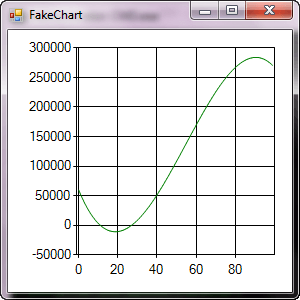Диаграмма создается динамически. в.net, C#
У кого-нибудь есть опыт работы с графиками в .NET? Специально хочу создать их программно.
using System;
using System.Collections.Generic;
using System.ComponentModel;
using System.Data;
using System.Drawing;
using System.Linq;
using System.Text;
using System.Windows.Forms;
using System.Windows.Forms.DataVisualization.Charting;
using System.Diagnostics;
namespace WindowsFormsApplication6
{
public partial class Form1 : Form
{
public Form1()
{
InitializeComponent();
}
private void Form1_Load(object sender, EventArgs e)
{
Random rnd = new Random();
Chart mych = new Chart();
mych.Series.Add("duck");
mych.Series["duck"].SetDefault(true);
mych.Series["duck"].Enabled = true;
mych.Visible = true;
for (int q = 0; q < 10; q++)
{
int first = rnd.Next(0,10);
int second = rnd.Next(0,10);
mych.Series["duck"].Points.AddXY(first, second);
Debug.WriteLine(first + " " + second);
}
mych.Show();
Controls.Add(mych);
mych.Show();
}
}
}
Я пытаюсь использовать .NET (.net 4, Visual Studio 2010) диаграмма, но случайно сгенерированный набор данных не появляется. Диаграмма осталась пустой. Я искал примеры и нашел только такие, как, и, да, с ручным методом "перетаскивания" это работает. Я понятия не имею, почему данные, которые я генерирую программно, не появляются.
5 ответов
Решение
Ага.
// FakeChart.cs
// ------------------------------------------------------------------
//
// A Winforms app that produces a contrived chart using
// DataVisualization (MSChart). Requires .net 4.0.
//
// Author: Dino
//
// ------------------------------------------------------------------
//
// compile: \net4.0\csc.exe /t:winexe /debug+ /R:\net4.0\System.Windows.Forms.DataVisualization.dll FakeChart.cs
//
using System;
using System.Windows.Forms;
using System.Windows.Forms.DataVisualization.Charting;
namespace Dino.Tools.WebMonitor
{
public class FakeChartForm1 : Form
{
private System.ComponentModel.IContainer components = null;
System.Windows.Forms.DataVisualization.Charting.Chart chart1;
public FakeChartForm1 ()
{
InitializeComponent();
}
private double f(int i)
{
var f1 = 59894 - (8128 * i) + (262 * i * i) - (1.6 * i * i * i);
return f1;
}
private void Form1_Load(object sender, EventArgs e)
{
chart1.Series.Clear();
var series1 = new System.Windows.Forms.DataVisualization.Charting.Series
{
Name = "Series1",
Color = System.Drawing.Color.Green,
IsVisibleInLegend = false,
IsXValueIndexed = true,
ChartType = SeriesChartType.Line
};
this.chart1.Series.Add(series1);
for (int i=0; i < 100; i++)
{
series1.Points.AddXY(i, f(i));
}
chart1.Invalidate();
}
protected override void Dispose(bool disposing)
{
if (disposing && (components != null))
{
components.Dispose();
}
base.Dispose(disposing);
}
private void InitializeComponent()
{
this.components = new System.ComponentModel.Container();
System.Windows.Forms.DataVisualization.Charting.ChartArea chartArea1 = new System.Windows.Forms.DataVisualization.Charting.ChartArea();
System.Windows.Forms.DataVisualization.Charting.Legend legend1 = new System.Windows.Forms.DataVisualization.Charting.Legend();
this.chart1 = new System.Windows.Forms.DataVisualization.Charting.Chart();
((System.ComponentModel.ISupportInitialize)(this.chart1)).BeginInit();
this.SuspendLayout();
//
// chart1
//
chartArea1.Name = "ChartArea1";
this.chart1.ChartAreas.Add(chartArea1);
this.chart1.Dock = System.Windows.Forms.DockStyle.Fill;
legend1.Name = "Legend1";
this.chart1.Legends.Add(legend1);
this.chart1.Location = new System.Drawing.Point(0, 50);
this.chart1.Name = "chart1";
// this.chart1.Size = new System.Drawing.Size(284, 212);
this.chart1.TabIndex = 0;
this.chart1.Text = "chart1";
//
// Form1
//
this.AutoScaleDimensions = new System.Drawing.SizeF(6F, 13F);
this.AutoScaleMode = System.Windows.Forms.AutoScaleMode.Font;
this.ClientSize = new System.Drawing.Size(284, 262);
this.Controls.Add(this.chart1);
this.Name = "Form1";
this.Text = "FakeChart";
this.Load += new System.EventHandler(this.Form1_Load);
((System.ComponentModel.ISupportInitialize)(this.chart1)).EndInit();
this.ResumeLayout(false);
}
/// <summary>
/// The main entry point for the application.
/// </summary>
[STAThread]
static void Main()
{
Application.EnableVisualStyles();
Application.SetCompatibleTextRenderingDefault(false);
Application.Run(new FakeChartForm1());
}
}
}
UI:

Попробуйте включить эти строки в свой код, после mych.Visible = true;:
ChartArea chA = new ChartArea();
mych.ChartAreas.Add(chA);
Добавить ссылку на System.Windows.Form.DataVisualization, затем добавьте соответствующий оператор using:
using System.Windows.Forms.DataVisualization.Charting;
private void CreateChart()
{
var series = new Series("Finance");
// Frist parameter is X-Axis and Second is Collection of Y- Axis
series.Points.DataBindXY(new[] { 2001, 2002, 2003, 2004 }, new[] { 100, 200, 90, 150 });
chart1.Series.Add(series);
}
Вам необходимо прикрепить Form1_Load обработчик Load событие:
using System;
using System.Collections.Generic;
using System.ComponentModel;
using System.Data;
using System.Drawing;
using System.Linq;
using System.Text;
using System.Windows.Forms;
using System.Windows.Forms.DataVisualization.Charting;
using System.Diagnostics;
namespace WindowsFormsApplication6
{
public partial class Form1 : Form
{
public Form1()
{
InitializeComponent();
Load += Form1_Load;
}
private void Form1_Load(object sender, EventArgs e)
{
Random rnd = new Random();
Chart mych = new Chart();
mych.Height = 100;
mych.Width = 100;
mych.BackColor = SystemColors.Highlight;
mych.Series.Add("duck");
mych.Series["duck"].SetDefault(true);
mych.Series["duck"].Enabled = true;
mych.Visible = true;
for (int q = 0; q < 10; q++)
{
int first = rnd.Next(0, 10);
int second = rnd.Next(0, 10);
mych.Series["duck"].Points.AddXY(first, second);
Debug.WriteLine(first + " " + second);
}
Controls.Add(mych);
}
}
}